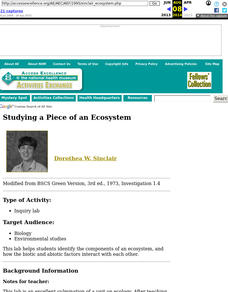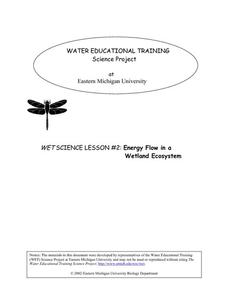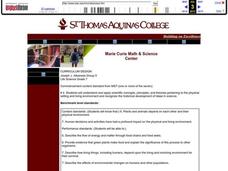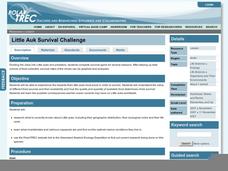Curated OER
Studying a Piece of an Ecosystem
Students carry out an outdoor land study in which they identify organisms living in the soil, and any other animals living within the site. Groups also examine abiotic factors. They respond to a series of questions concerning their data...
Curated OER
Fresh Produce North of 60
Teen-agers discuss how fresh produce is brought into areas that do not have agreeable growing conditions and read an article from Canadian Agriculture at a Glance. They write an essay about projects that may help provide food in these...
Curated OER
Good Enough To Eat
Students are introduced to the five food groups. In groups, they place different foods into the correct section of the Food Pyramid. Using different types of technology, they create one page of a class ABC book sharing what they know...
Curated OER
Circle of Life
Here is a well-designed science lesson that shows learners that everything that organisms do in ecosystems, including running, breathing, burrowing, growing, requires energy. After a thorough discussion of their own eating and drinking...
Curated OER
Make a Farm
After a class discussion about where their food comes from learners construct a farm from a print-out (embedded in the plan). They work in groups, and trace a food source from the beginning. For example, they discover how a farmer grows...
Eastern Michigan University
Energy Flow in a Wetland Ecosystem
How is energy transferred within an ecosystem? What would happen to a food web if one of the organisms was removed? Elementary or middle school ecologists examine these questions and more in a comprehensive 5E learning cycle lesson....
Curated OER
Plants and Animals
Seventh graders discover the interconnectedness of plants and animals in ecosystems. In groups, they create a food web and discuss the problems when one link of the chain is broken. To end the lesson, they set up a balanced environment...
Curated OER
Visual Vocabulary
Students interpret and name the vocabulary termed acted out by the mime. In this science/language arts/physical education lesson plan, students are given a set of vocabulary terms to discuss within their group. Next, students place all...
Curated OER
Evidence of Photosynthesis
Hands on science is the way to go! Learners conduct a lab experiment to help them explain how plants make food through photosynthesis. They test for the presence of starch in leaves using iodine solution and identify the basic things...
Baylor College
We Need Water
There's nothing quite like a glass of ice-cold, freshly squeezed lemonade. Lesson seven of this series explains how the water humans need to survive can come in many forms. Teach your class about how much water humans require every day...
Curated OER
Adaptation Investigation - Extreme Beaks
Find photos of bird beaks or show a prepared four slide PowerPoint, "Extreme Beaks" to introduce your class to this special animal adaptation. Provide them with a data table and supplies to try gathering food with tools that each...
Desert Museum
Daisy Ecology
Here's a fine lesson that combines poetry with life sciences. Learners carefully listen to a poem that's all about a food chain. As the poem is read, learners name the producer, the herbivore, the carnivore, and the omnivore. Lots of...
Curated OER
Flutterings and Flowers
Fourth graders investigate the significance of natural resources and the habitats of butterflies. They create a list of their own favorite foods, then watch a video about habitats. Students identify things in the video that animals and...
Polar Trec
Animal Monitoring Introduction
Not only do mealworms taste great, they are also great for classroom science lessons. In pairs, young scientists observe and record what they see as they check out what their mealworms are doing from minute to minute. Each minute...
Chicago Botanic Garden
Leaf Litter Ecology Lab
Some organisms spend their entire lives in leaf litter. The third in a series of six is a great lesson exploring the community of leaf litter. Groups gather and then spread leaf litter over white paper and remove leaves/twigs while...
Salt River Project
How Do We Clean Polluted Water?
How do we clean up oil spills and other pollutants in the water? Explore water treatment strategies with a set of environmental science experiments. Groups remove oil from water, work with wastewater treatment, and perform a water...
NOAA
Deep-Sea Ecosystems – Entering the Twilight Zone
Imagine an ecosystem without any light or oxygen, where living things convert carbon dioxide into food. This ecosystem is thriving and might just be the largest ecosystem on our planet, yet we know very little about it. The lesson...
Curated OER
Farming: It's a Fact
Understanding where our food and textiles come from is key to understanding business, economics, and the importance of modern agriculture. Learners play a game, read text to determine farm fact from opinion, and itemize a grocery receipt...
Curated OER
it's Lonely At The Top
Students explore the differnences between food producers in food webs and food consumers in food chains. Behavioral choices of primary and secondary consumers such as herbivores, vegetarians, carnivors, and omnivors are analyzed.
Curated OER
Where's Dinner?
Upcoming marine biologists consider a list of organisms residing near the Lost City hydrothermal vents and construct a food web. They compare the food web to that of a cold seep community, of which they should have previous knowledge....
Curated OER
Peregrine Falcon
Young environmentalists study the effects that pesticides have on birds, such as the peregrine falcon. They also look at predator/prey interactions. Some wonderful in-class activities accompany an inventive lesson. After an activity that...
Curated OER
Name That Leaf
Take a walk through nature with a science experiment about leaves. Third graders use a branching diagram to group attributes of certain kinds of leaves, such as oak, pine, and chestnut. For extra practice, they can collect leaves and...
Curated OER
Little Auk Survival Challenge
A bird's life is one of danger and intrigue as it struggles for survival in sometimes harsh environments. To understand how difficult surviving in the wild can be, children play a simulation game where they act as little auks, birds from...
Curated OER
Recycling and Composting
Students set up composting sites that allow food scraps and paper to be recycled by nature. They are introduced to one aspect of recycling; composting. Students see how God recycles as the worms change garbage into something that brings...

























